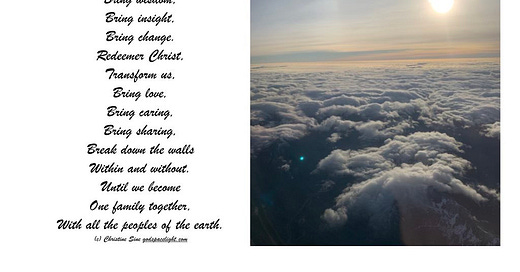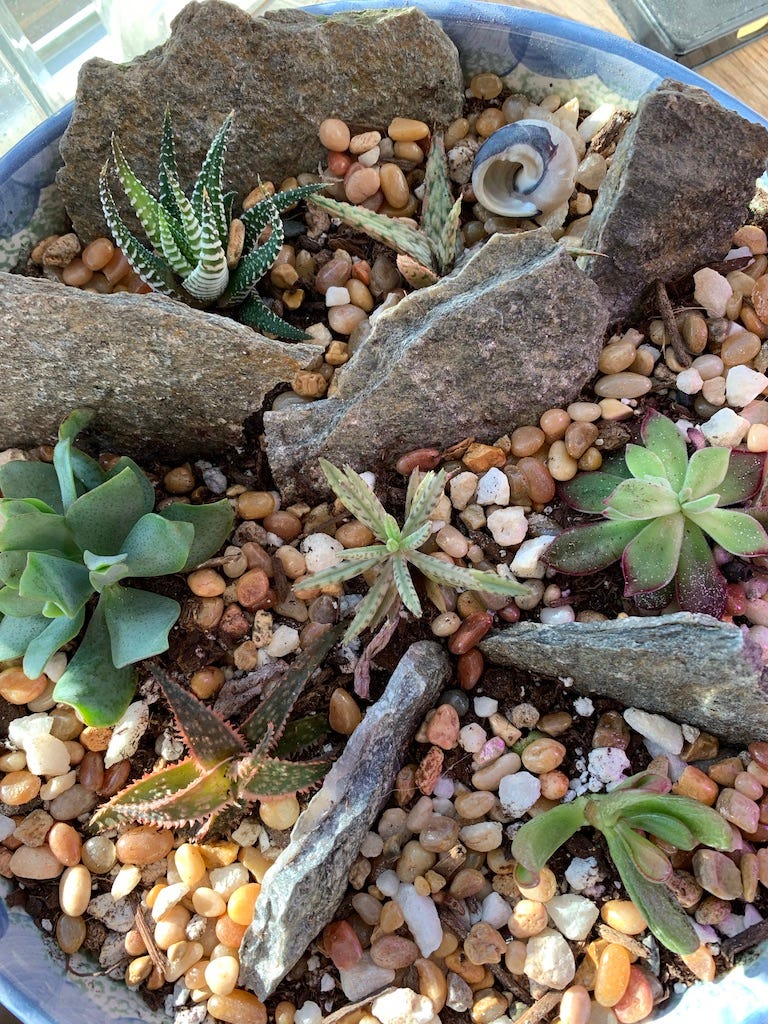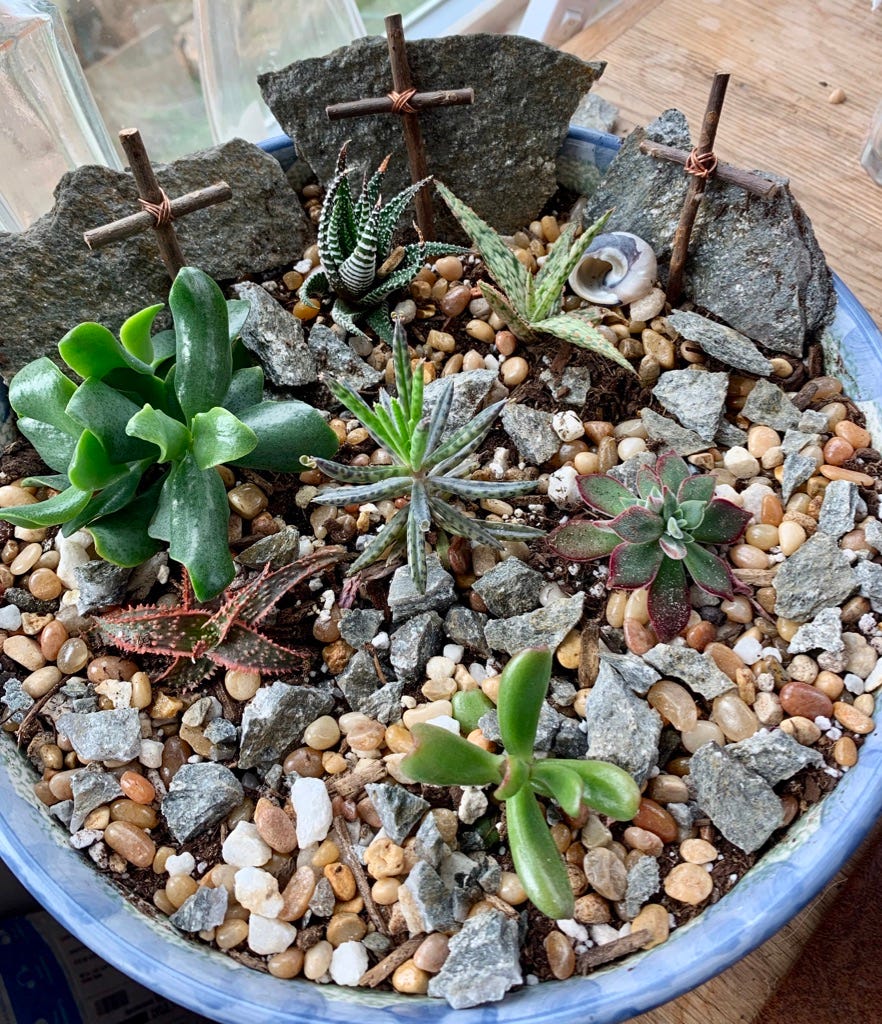On Monday I posted one of the most significant posts I have ever written. I related some of the challenges I am facing as my husband’s dementia progresses. I was amazed at the response. People coming out of the closet as it were and sharing their own stories of spouses, parents or grandparents struggling with the same issue. Many of them had never shared their struggles before.
Last year my theme for Lent was “Breaking Down Walls”, a theme we also used in 2019 as our justice focus for the season. As I processed the responses to Monday’s post I realized that this is another place where we need to break down walls. Being open, being vulnerable, being unafraid to hide behind the smiley faces that say “I am OK” when I really am not. All these are walls that I would love to see broken down.
In 2019 I created a Lenten garden which I divided into small spaces separated by walls made with pieces of slate. Each week I smashed one of the slate pieces, revealing the segment of garden behind it. It amazed me to see how my perspective of that garden changed as I removed the barriers.
This year it seemed more than ever that we need to break down the walls that separate us from each other and I challenge you to consider breaking down walls in your own life and perspective on the world this year as part of your Lenten journey. This was reinforced for me as I read through my commentaries on the Beatitudes this week. So many of the Beatitudes were breaking down walls between those who believed rigidly in the Old Testament commandments and the new way of grace and peace and love that Jesus proclaimed.
This week too we celebrated the 5 year anniversary of the start of COVID. There was hardly a ripple as this momentous occasion passed. Unfortunately we have chosen to push this plague under the carpet rather than confront it and its impacts on our lives and society. I suspect that much of the chaos, the hate, the violence and disruption that we see around us is, at least in part, a result of the lack of healthy grieving associated with COVID and the way it changed our world for ever. Many still suffer from PTSD. Some are struggling with long COVID affects. Trauma ignored or hidden behind walls is not healthy and I feel we are seeing some of those unhealthy consequences everywhere around us these day.
When I suggested our need to break down walls to Godspace writers last year, Elaine Breckenridge commented:
I am pleased that the theme for Lent will revolve around justice. However I do struggle with the metaphor, “Breaking Down Walls.” I know it is a metaphor. But metaphors evoke pictures. Seeing walls knocked down looks violent to me. When I think of Gandhi and Dr. Martin Luther King, I see images of passive resistance on the part of those working for justice. When I think of Desmond Tutu and his great work in South Africa, I see images of people talking with one another and reaching reconciliation. It seems to me justice is an expansive and creative work steeped in peace, not destruction.
Breaking Down Walls Shouldn’t be Violent.
Elaine is right, breaking down walls can be a violent act, though it can also be an act of release, of love and of hope, as walls separate us from each other and keep us isolated from the pain of our world. I must confess however, that when I first read her comment I thought “but I would want the bridges to smash the walls” because it is my experience that bridges can only be built when walls have started to fall. I think of some of the walls I have seen fall in my lifetime.
The Berlin Wall, which I visited in the 1980s and kept a piece of until recently when I gifted it to a friend, is the first that comes to mind. My fragment of the wall was collected by a German friend, who, together with others, prayed for years for the breaking down of the wall. The statues of Stalin in Poland and other former Soviet countries, some of which I saw torn down after Poland’s release from the Soviet Union is another wonderful memory of walls falling. The wall of silence about black deaths at the hands of the police in the U.S., the increasingly obtrusive barrier to people crossing from Mexico to the U.S, our confrontation with the consequences of climate change are all examples of walls that are still in the process of being broken down. Tragically some of these walls seem to be strengthening rather than weakening. Unfortunately, none of these walls come down without violence, even though the crumbling of the walls themselves were not violent acts. In fact they were acts of freedom and liberation.
Sometimes we need to break down walls so that we can build bridges. If we build bridges when the wall still exists, we still have barriers to peaceful, freedom giving action. What we need to work towards is a society of justice and understanding and compassion in which walls are not thought to be necessary.
Are We Too Used to Walls?
A couple of years ago, the Guardian published Tear Down these Walls or Get Used to A World of Fear, Separation and Division which made me feel that our challenge to break down walls during Lent was indeed a timely topic yet again. Evidently “the EU/Schengen area is now surrounded or crisscrossed by 19 border or separation fences totalling 2,048km in length, up from 315km in 2014. Similar trends are discernible worldwide.” Walls that split nations in half, or that surround nations to keep out refugees and displaced people are more common than ever. In fact Wikipedia lists 59 such walls throughout the world, most of them designed to curb the movement of refugees and illegal immigrants. And these walls have grown stronger and more permanent since last year.

Walls are not new. The Roman Empire built several including Hadrian’s wall in Britain, designed to keep the warlike Scots out of Roman occupied territory and the Great Wall of China built to keep out the nomadic tribes of Mongolia. What is concerning however is that most of today’s walls have been built in the last 20 years. We live in a very sobering world of division and isolation. As the article in the Guardian says:
These barriers are supposed to fend off military and terrorist threats. But what they mostly do is create obstacles to peace. Often they increase frictions. At best, they freeze enmity in place.
Walls Create Barriers to Peace
Walls, whether they be physical, emotional or spiritual often create barriers to peace. They highlight that people who are different from us be it because of race, ethnicity, gender orientation or beliefs are not welcome and maybe more importantly their views and ideas are not welcome and are seen to have lesser value than our own. In many cases that are not regarded as having any value at all.
In 2019 Fran Pratt wrote a beautiful Litany about breaking down walls
If we can forget the idea of separation,
Perhaps we can stop building walls on its behalf.
Oh God, may we let love have free reign
To build something more imaginative than walls.
When love has free reign there are no walls, so I suggest we work to break down the walls of separation and build bridges where those walls once stood.
Listen Carefully and Respectfully.
Walls are so often designed to keep out people or ideas we see as a threat, without really understanding who the people are or what the ideas mean. To listen carefully and respectfully, we must be secure enough in who we are to not be threatened by another person’s opinion. What are the fears that make us feel walls are necessary, not just on the border, but in other parts of our lives too? Listening does not mean we agree with each other, but hopefully it does mean that we can accept and love each other in the midst of our disagreements and work to build bridges rather than walls.
What if we decided to break down these walls for Lent in the spirit of the Beatitudes, and truly listened to each other? Here are some suggestions on how to do this.
Prayerfully read through the Beatitudes as translated by Glen Strassen again:
Joyful are those who are poor and humble before God, for their’s is the reign of God.
Joyful are those who are deeply saddened to the point of action, for they will be comforted.
Joyful are those whose wills are surrendered to God, for they will inherit the earth.
Joyful are those who hunger and thirst for restorative justice, for they will be filled.
Joyful are those who practice compassion in action, for they will receive compassion.
Joyful are those who seek God’s will in all that they are and do, for they will see God.
Joyful are the peacemakers, for they will be called children of God.
Joyful are those who suffer because of restorative justice, for theirs is the reign of God.
Joyful are you when they criticize, persecute, and slander you, because of me.
Rejoice and be glad, for your reward is great in God.
For in the same way they persecuted the prophets before me. (Living The Sermon on the Mount 39)
This alternative plan, which is at the heart of Jesus’ ministry, is a prescription for breaking down walls. In what ways could committing to live more according to these values not only transform your life but also break down some of the walls that still exist in your heart?
Let’s preach a theology of inclusion. So often we create walls between us and those who look or practice faith differently than we do because we focus on difference rather than similarity. We are all created in the image of Christ and Paul reminds us in Galatians 3:28 that, “There is no longer Jew or Gentile, slave or free, male and female. For you are all one in Christ Jesus.” What does that look like in our world today? How could we use Lent to break down walls that exclude other ethnicities, other denominations and other sexual orientations?
Why not visit a church of a different denomination each week during Lent – an African American church, a Catholic Church an Orthodox Church, a LBGTQ affirming church or a very conservative church. If there is a church with mainly refugees in your area, it would be good to include that as well. You might even like to add a mosque and a Jewish synagogue to the mix. Invite your friends to join you. Have a discussion afterwards asking: What did you learn about God? And what did you learn about faith?
Encourage practices that help you get to know your neighbors. Random acts of kindness in the neighborhood are great ways to break down walls that isolate us from those around us. One of the positive impacts of the COVID lockdown was that many of us got to know our neighbours and our neighbourhoods. People reached out to help those who lived alone. We walked around the neighbourhood and talked to people we had never met before. Our neighbours brought us groceries every week. These are practices we still need. Maybe Lent this year is a time to reach out once more to those who live near us.
Be open to change. When we interact with people who are very different from us, we must be willing to learn and be receptive to the change God may demand of us. I am still impacted by the words of African American preacher Leroy Barber who once told me, “white people want us to show up but they don’t want us to change how we do things.” and the even more powerful words of Native American Richard Twiss( June 11, 1954 – February 9, 2013) “We don’t want you to invite us to sit at your table. We want to create a new table together.’ We need to encourage flexibility, equality, diversity, inclusion and a willingness to both see and do things differently.
Share in the pain of the excluded. When we listen to the stories of other people’s pain, we have the choice of strengthening the walls that divide us by turning away from or ignoring the suffering that overwhelm us. Alternatively, we can take the pain we hear expressed into ourselves in the same way that Jesus took on the pain and suffering of the world. Then, we must allow God to comfort us in the midst of that pain and share that comfort and compassion with others. Teaching our congregations to listen to the pain of others and respond in compassionate and caring ways could be one of the most powerful things we could teach during Lent. Listen, pray, respond is a great mantra to teach our members to use during Lent.
Encourage practices that break down the wall to climate change denial. All of us live in denial to a certain extent because we are overwhelmed by the implications of the disaster of climate change and human culpability in creating it. We need to both educate ourselves and our neighbours to the consequences and help institute solutions. We just signed up to have solar panels installed on our roof and during Lent this year I plan to look at other steps we can take to make our way of living more sustainable.
Lent is meant to be a season that prepares us to live more effectively as followers of Christ. And that is all about breaking down walls that exclude and isolate us. What will you do to prepare to break down the walls within yourself and your congregation during this season?
Refocus Your Faith.
Breaking down walls, just like the Beatitudes, is all about reorienting what faith is meant to be about. What if I use the season of Lent to help me rethink who I am not in terms of what Christ has done for me, but in terms of what Christ wants to do through me for others?
What if I read life differently?:
through the lens of laughter and fun?
through the filter of joy and peace?
through the framework of gratitude and thankfulness?
through the wonder of God’s all embracing love?
I am starting to think beyond Lent and even beyond Easter, and as I think about breaking down walls in the coming season there are other questions that lodge in my mind.
As the seasons change what do I need to let go of in order to fully enter the richness of this new season?
As I look at our world, what language do I need to change to become a better steward and carer for those who look and think differently from me ? When I moved to the U.S. I quickly learned that the language I grew up with could create barriers rather than bridges. I needed to adapt so that I could be more easily understood.
As I think about my faith what perceptions and understandings need to change in order to embrace that which I normally exclude? I find that the longer I follow Christ, the closer I draw to the heart of God, the more I need to change - becoming more forgiving, less critical and less sure who is and who is not acceptable to God. Breaking down walls often means forgiveness and reconciliation.
And with all these questions revolving in my mind it is not surprising that my initial thoughts have turned to poetry, that fertile ground of exploration and expression for me.
Read life differently.
Allow Lent to transform you.
Live with love not hate,
With compassion not judgement,
With generosity not scarcity.
Break down walls
That separate and divide.
See your cup,
Not half full,
Not half empty,
But overflowing with goodness and light and life.
Read life differently.
Let for the wonder of uniqueness,
Not the exclusion of sameness.
Encourage the richness of diversity.
Build towards equality.
Embrace don’t reject.
Forgive don’t condemn.
Seek to follow Jesus, the Son of God,
In all you are and do.
Work diligently to know,
He who is the way, the truth, the life.
Follow in his footsteps,
Into the way that leads to eternal life.







Thank you again for an awesome post. Just talking about something breaks down walls. I loved that you mentioned COVID because, as well as it being a difficult time for me with it being the 13th anniversary of my sister's untimely death and hot on its heel a close friend's suicide, I have been finding this 5th anniversary of COVID triggering on many levels. Really all 3 of these events in my life need walls coming down via talking.
Another interesting one that I noticed there were walls at was a dog walking friend has just had an mastectomy but when I told a male dog walking friend this his response was that we shouldn't talk about it. We have before talked openly about other cancers that have taken other dog walking friends. But I found this very interesting that there seemed to be a wall around talking of having a breast removed.
I will ponder those unseen and untalked about walls that are all around us. Thank you for raising it
XX